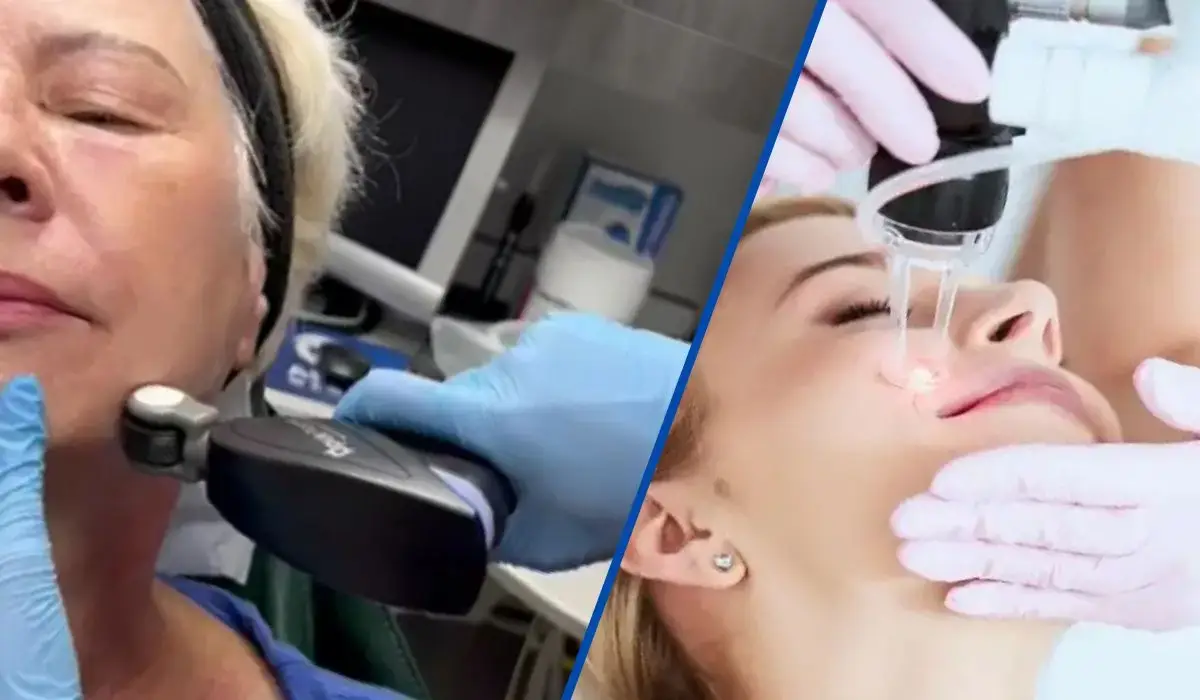
In 2025, non-surgical skin treatments are raising the bar for what patients expect—fast recovery, advanced safety, and visible, lasting results. One of the most common comparisons we’re asked about at Schaumburg Dentistry is Opus Plasma vs. laser skin resurfacing: which one actually delivers better outcomes?
With the introduction of Opus Plasma Skin Resurfacing, the conversation has shifted. This new technology uses radiofrequency and plasma energy to improve skin tone and texture with minimal downtime. As more patients in Schaumburg seek alternatives to aggressive lasers, understanding the differences between these two treatments is more important than ever.
Skin resurfacing is a non-surgical treatment designed to address visible signs of aging, sun damage, and scarring. It works by removing or stimulating repair in the upper layers of the skin, encouraging the production of collagen—a structural protein that keeps your skin firm, elastic, and youthful.
According to the American Society of Plastic Surgeons, demand for skin-resurfacing treatments has grown by over 50% in the last decade due to their minimally invasive nature and high satisfaction rates. Most people choose resurfacing because it doesn’t require anesthesia, offers faster recovery than surgery, and provides visibly smoother, firmer skin with minimal risk when performed correctly.
Tooth extraction complications like dry socket can also affect facial sensitivity and healing. Read more about prevention and treatment here: Dry Socket After Tooth Extraction.
Ready to experience the benefits firsthand? Schedule your Opus Plasma consultation today with Schaumburg Dentistry or call us at (847) 985-8100 for expert guidance.
Traditional laser resurfacing works by delivering high-intensity light to vaporize or heat layers of skin. While effective, it can be more invasive—particularly for patients with sensitive or darker skin types.
Opus uses a different mechanism: it delivers controlled plasma energy through fractional radiofrequency. This creates precise microchannels that stimulate collagen remodeling while minimizing collateral damage to the surrounding tissue.
As more providers compare Opus Plasma vs. laser skin resurfacing, the contrast in patient comfort, healing, and risk becomes increasingly clear.
Feature | Opus Plasma | Traditional Lasers |
Energy Source | Radiofrequency + Plasma | Light-based (CO₂, Er:YAG) |
Precision | High — fractional energy | Moderate to high |
Downtime | 24–48 hours | 5–10 days |
Compatibility | Suitable for all skin tones | Often limited to lighter tones |
Risk of Pigmentation Issues | Low | Moderate to high (in darker skin) |
The unique thermal profile of plasma minimizes unnecessary skin injury while delivering enough energy to kickstart deep tissue remodeling. That’s why many consider it a breakthrough for safety and comfort.
One of the biggest advantages of newer resurfacing systems like Opus is the shorter recovery period. A session typically takes under 30 minutes. Most patients describe the sensation as a warm, prickly feeling—not painful, especially with a topical numbing cream applied beforehand.
Mild redness and swelling usually subside within 24 to 48 hours. Makeup can often be worn the next day.
In contrast, traditional laser procedures—particularly ablative ones—may result in swelling, peeling, and crusting for up to 7–10 days. Post-care often involves ointments, cold compresses, and avoiding sun exposure for an extended period.
When choosing between Opus Plasma vs. laser skin resurfacing, downtime is a major factor for people with demanding schedules.

The effectiveness of any resurfacing treatment depends on your skin goals and expectations. Both options stimulate collagen and lead to firmer, healthier-looking skin. However, the mechanisms behind how they do so differ.
Maintenance is easier, often needing just 1–2 sessions per year after initial results
The right resurfacing approach depends on your skin type, sensitivity, and the severity of concerns.
Understanding the benefits of Opus Plasma—such as minimal downtime, lower risk of pigmentation issues, and suitability across skin tones—can help determine if it’s the right fit for your needs.
If you’re still weighing Opus Plasma vs. laser skin resurfacing, speak to a qualified provider who can assess your skin and make recommendations tailored to your goals.
Schaumburg residents trust our team for personalized treatment plans that deliver results. Visit Schaumburg Dentistry or explore our Opus Plasma Skin Resurfacing page to learn more. Call us now at (847) 985-8100 to book your consultation.
The demand for non-invasive cosmetic treatments continues to rise in Illinois—and we’ve responded by offering options that are safe, efficient, and rooted in science. As a trusted name in general dentistry in Schaumburg, our team prioritizes precision and patient comfort in everything we do.
What makes our approach unique is how we combine medical expertise with advanced technology—ensuring every patient receives customized treatment backed by clinical results. Our experience as top Invisalign providers translates naturally into aesthetic care, where precision and planning are just as critical.
Our recommendation of Opus is based on real patient outcomes, peer-reviewed research, and the superior safety profile it offers across all skin tones.
Technology has made skin resurfacing safer, faster, and more precise than ever. Between the reduced downtime, improved comfort, and broader skin-type compatibility, Opus Plasma continues to stand out compared to traditional laser treatments. For many, it’s not just the better option—it’s the smarter one.
Schaumburg Dentistry is here to help you take the next step toward healthier, smoother skin.Visit our Opus Plasma Skin Resurfacing page for treatment details or explore general dentistry in Schaumburg and Invisalign provider services on our main site.
If you’re looking for the best skin resurfacing clinic Schaumburg residents trust, call us at (847) 985-8100 to schedule your consultation today!